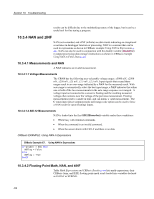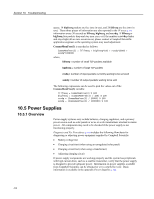Campbell Scientific CR1000KD CR800 and CR850 Measurement and Control Systems - Page 413
CommsMemFree2, 4.3.3 CommsMemFree3
 |
View all Campbell Scientific CR1000KD manuals
Add to My Manuals
Save this manual to your list of manuals |
Page 413 highlights
Section 10. Troubleshooting Table 110. CommsMemFree(1) Defaults and Use Example, TLS Active Example Buffer Category Condition: reset, TLS active. Buffer count: CommsMemFree(1) = 230999960. Condition: TLS enabled, no active TLS connections. Connected to LoggerNet on TCP/IP. Buffer Count: CommsMemFree(1) = 228968437. Numbers of buffers in use (reset count - in-use count) tiny 160 137 23 little 99 84 15 medium 99 96 3 large 30 28 2 huge* 2 2 0 *If email clients using TLS are active, huge will be decremented along with some of the others. 10.4.3.2 CommsMemFree(2) CommsMemFree(2) displays the number of memory "chunks" in "keep" memory (p. 435) used by communications. It includes memory used for PakBus routing and neighbor lists, communication timeout structures, and TCP/IP connection structures. The PakBusNodes setting, which defaults to 50, is included in CommsMemFree(2). Doubling PakBusNodes to 100 doubles CommsMemFree(2) from ≈300 to ≈600 (assuming a large PakBus network has not been just discovered). The larger the discovered PakBus network, and the larger the number of simultaneous TCP connections, the smaller CommsMemFree(2) number will be. A PakBusNodes setting of 50 is normally enough, and can probably be reduced in small networks to free memory, if needed. Reducing PakBusNodes by one frees 224 bytes. If CommsMemFree(2) drops and stays down for no apparent reason (a very rare occurrence), please contact a Campbell Scientific applications engineer since the CR800 operating system may need adjustment. 10.4.3.3 CommsMemFree(3) CommsMemFree(3) Specifies three two-digit fields, from right (least significant) to left (most significant): • lilfreeq = "little" IP packets available • bigfreeq = "big" IP packets available • rcvdq = IP packets in the received queue (not yet processed) At start up, with no TCP/IP communication occurring, this field will read 1530, which is interpreted as 30 lilfreeq and 15 bigfreeq available, with no packets in rcvdq. The Ethernet and/or the PPP interface feed rcvdq. If CommsMemFree(3) has a reading of 21428, then two packets are in the received 413















